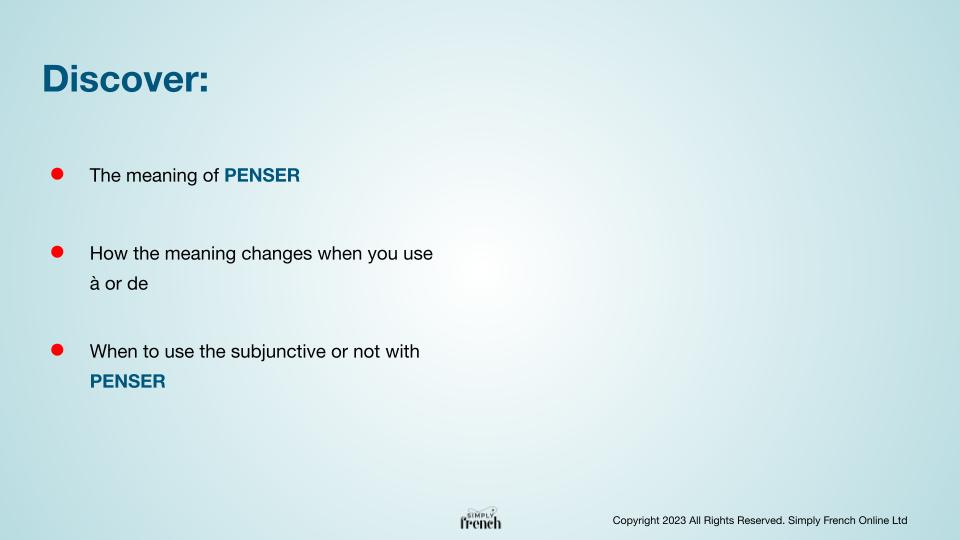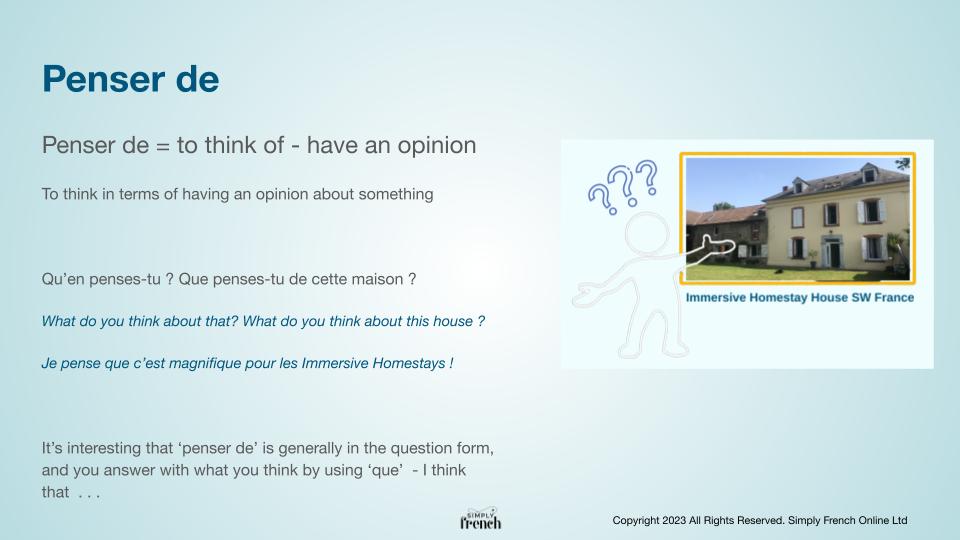Penser A or DE ?
Jan 31, 2023What’s the difference between penser à and penser de? Since this French verb is essential, let’s focus on it in this mini-lesson.
How to use PENSER A and DE, that’s if you even need it in the first place.
Avoid making common mistakes when using the verb PENSER. And then . . . do you use the subjunctive or not? It’s easier than you think!
You’ll be learning:
- The meaning of PENSER
- How the meaning changes when you use à or de
- When to use the subjunctive or not with PENSER

How do you say “to think” in French?
Whenever you desire to plan something or intend to do something, the first French verb that should come to your mind is penser.
Fortunately, it’s a regular verb that goes like this:
- Je pense
- Tu penses
- Il / elle pense
- Nous pensons
- Vous pensez
- Ils / elles pensent
Here’s an example for you:
- Je pense manger dans le jardin car il fait tellement beau ce midi >>> I’m thinking of eating in the garden as it’s so lovely this lunchtime.

How to use “penser à”.
The French verb penser is multifunctional. Let’s have a look at it with the preposition à.
The combination of these 2 words refers to having something in your mind and is the equivalent of thinking about something or someone.
The question would be like this:
- À quoi tu penses ? >>> What’s on your mind?
Another sentence with the verb and this preposition:
- Je pense à promener les chiens >>> I’m thinking about walking the dogs.

When to say “penser de” in French.
This time, let’s observe what’s happening with the preposition de. The meaning is rather different since it now applies to give your opinion.
In English, it would be “to think of”.
Indeed, the question is like the following:
- Qu’en penses-tu ? Que penses-tu de la maison ? >>> What do you think about that? What do you think about the house?
What about the answers? You could have this option:
- Je pense que c’est magnifique pour les Immersive Homestays! >>> I think it’s great for Immersive Homestays!

What does “ne pas penser que” mean in French?
Do you know what the negative structure means in French? When do we use it?
Basically, you would apply it whenever you are not sure about something.
There’s a trick though.
Indeed, it involves a subjunctive (only for the negative form whereas for the positive one, you will opt for the Indicative mood.
Let’s see with real examples:
- Je ne pense pas que tu aies encore fini >>> I don’t think you’ve finished it yet.
- Je ne pense pas que ça soit encore prêt >>> I don’t think that’s ready yet.

In case you don’t master the subjunctive, there are several articles for you like these:
- How to express obligation and necessity with IL FAUT QUE
- Simple Subjunctive I want you to in French
- Easy French subjunctive? I doubt it!
- Easy French Trigger Phrases for the subjunctive
- How to form the subjunctive in French
- Managing irregular verbs for the subjunctive
The main differences between “penser à” and “penser de” in French.
As you have seen, the French verb penser is regular. In addition, with a preposition, its meaning varies.
On one hand, the verb with the preposition à refers to thinking about something.
On the other hand, with the preposition de, it entails an opinion.
- Penser >>> to think of , have an intention
- Penser de >>> to think of , have an opinion
- Penser à >>> to think about
- Ne pas penser + subjunctive >>> to be unsure

So, tu penses que you have understood the mini-lesson? I hope so. If not, feel free to reach me with all your questions.
Free Masterclass
Learn my 4 step method of how to hold meaningful french conversations the R.E.A.L. way in just 30 minutes a day.
When you signup, we'll be sending you weekly emails with additional free content

